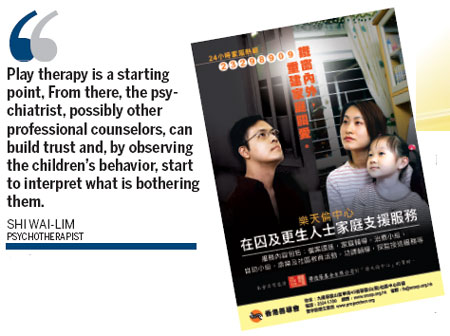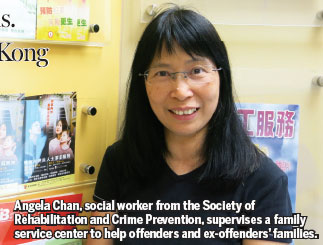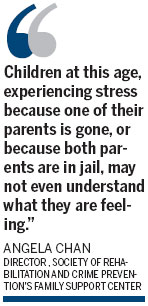Learning the cost of a loaf of bread
Updated: 2013-08-30 07:44
By Li Yao(HK Edition)
|
|||||||




The Correctional Services Department says there are 7,593 inmates in Hong Kong prisons. Many have left behind families that have lost their principal breadwinner. In all of Hong Kong only one agency has undertaken the mission to try to ease the pain. Li Yao writes.
Wong Hing-fai and his wife, Lai Man-sun, were summoning the courage to break the bad news to their son and daughter that Lai, 34, was in trouble with the law. She was arrested for stealing a loaf of bread, the fourth time she'd been arrested for petty theft. Lai was looking at the prospect of a lengthy jail term. The couple was utterly lost about how to break the news to their kids.
Their 10-year-old son already knew something was wrong. He'd heard all the fights that happened late at night - Lai crying inconsolably, talking about suicide. The boy said nothing - kept everything bottled up inside. But Lai knew there was something going on with the boy. She found him sleep walking. He'd go into the kitchen, turn on the light and go back to bed.
The couple took the kids to the Society of Rehabilitation and Crime Prevention's family support service center. This is the place where families in trouble with the law get help. Children, naturally, are a big part of the focus at the center. There's a playroom for kids, 3 to 11. They can read, draw, play with dolls, toy cars, or plastic animals. There is a mat on the floor, a couch and lots of colored chairs for them to go around.
There's also a social worker - a sort of big sister or big brother who watches them play. "Children at this age, experiencing stress because one of their parents is gone, or because both parents are in jail, may not even understand what they are feeling. They probably don't have the verbal skills to express what they are feeling," said Angela Chan, supervisor of the center.
"But if they don't get help, they start to feel unloved and become insecure. Then they get angry," Chan added.
After two or three visits to the center, the kids usually start to feel at home and start expressing themselves, not always in ways most of us think of as reflective of healthy social adjustment. They attack the dolls, whaling away at the lifeless surrogates with kicks and punches and shooting them with toy guns. The quieter kids have other outlets, like arranging a toy dish set for a family meal. Either way the pain comes out - the empathetic observer can read the sorrow that tears kids apart: a little girl laying out plates for dinner, sets the "father figure" at a distance. The social worker asks the girl if she's angry with Dad. The question strikes a chord with the little girl. Kids aren't supposed to be angry with their parents or hate them - so they don't deal with their feelings or even recognize them. Yeah, she is angry and somebody understands how she feels.
In the future, the child will come back to the social worker when she wants to be close to someone who will give her understanding and guidance.
Volunteers come once a week to help with the kids' school work. "We want these children to have an adult they can talk to as a friend, or look up to as a role model. Some parents are in jail for selling drugs. Kids need to learn right from wrong, and break away from the bad influences of their parents," Chan said.
Benefits of play therapy
Shi Wai-lim, a psychotherapist who's practiced for 10 years, says children suffer real damage when their parents get into trouble with the law. The kids usually turn the family calamity back on themselves. They start to experience low self-esteem. Parents aren't there to pay attention, to give guidance or encouragement. The kids come to the point where they think they don't have much value to anyone.
"Play therapy is a starting point. From there, the psychiatrist, possibly other professional counselors, can build trust and, by observing the children's behavior, start to interpret what is bothering them," Shi said.
Shi described watching a boy tear off the head, hands and feet of a doll - a male doll. The boy's father had abandoned his family, leaving the mother and child to struggle alone. The boy was still feeling rage toward his father, even though years had gone by.
Play therapy helps children rebuild their self-esteem and appreciate who they are and the value they have, rather than to let the problem fester and sour the kid into an unregenerate whiner, blaming others for the disappointments and failures of life.
There's another important social mechanism in this playtime interaction with other children. The offspring of troubled families learn they aren't the only ones whose families have trouble. Just that tiny revelation can start to ease the heavy weight of emotional baggage so the kids can start healing. There's still a lot more to be done. The child's caregivers need to get involved. They also have to change - the way they teach the children and the way they communicate. If they fail to make the changes, then the toxic environment never changes. Kids fall back into their old problematic ways. It doesn't take long, Shi said.
Better parenting is also needed
It's painful for parents to confront the reality that it is they who are causing their kids emotional distress.
When Lai Man-sun came up for sentencing for petty theft, August 9, she got a break. Taking into account that Lai is treated for moderate depression, the judge handed her 18 months' probation.
Lai was thankful for yet another chance to sort out her life. She and Wong talked. They started to understand the damage their toxic relationship was causing their children. Their son was overly protective of Lai. If she went out of his sight, he'd get anxious and start looking for her, even after a few minutes.
"My husband and I had fought a lot. I smoked, drank, threatened to leave and attempted suicide, trying to scare my husband into giving me better care. But in the end, I scared my son," Lai said remorsefully.
While the boy had drawn closer to Lai, he'd become alienated from his father.
Wong, a chef, was earning barely enough to put food on the table.
Lai's low spirits became chronic: enduring financial straits, feeling that she was neglected by her husband. Then in the middle of all the other problems, Lai learned she was pregnant. Wong and Lai decided for Lai to get an abortion.
She went alone to Shenzhen, and had it done there in early April. She came back to Hong Kong feeling emotionally shattered and, a few weeks later, was caught red handed trying to filch the loaf of bread.
Her path took her to a social worker who recommended that Lai see a psychiatrist. The psychiatrist found that Lai was depressed and gave her some anti-depressants and sleeping pills, and Lai's been visiting Princess Margaret Hospital regularly to see the psychiatrist since last month.
Wong told Lai not to worry about anything until she's better. Their daughter will start primary school in September. The burdens won't get any lighter. What's important is that the couple has determined to try harder, and make it work again with some outside help.
They're getting home visits from the family center. Their kids are enjoying the playroom at the center and sometimes join study groups organized by volunteers.
"Inviting a troubled kid to a playroom will not solve all their problems. They need time to adjust and find their own solutions. Our team will follow up with the kids' families for years to provide tailor-made intervention", Chan said.
Contact the writer at liyao@chinadaily.com.cn
(HK Edition 08/30/2013 page4)